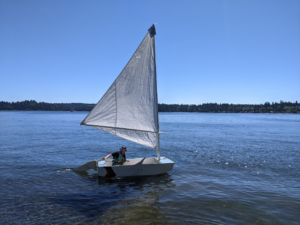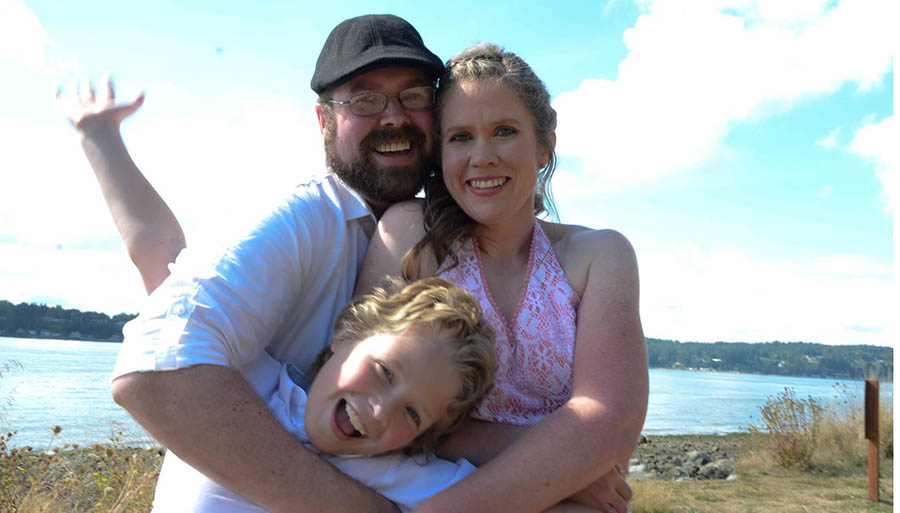Guided by the mind of an engineer and love for his community, Mike Smit has made a commitment to affordable housing and HRB. He’s now a major donor—at the age of 39.
In 2019, not long after Mike sold some Amazon stock, he walked down to the office of HRB and delivered a large check. Six months later, when he sold his home for twice what he paid, he set up a monthly donation. “I immediately felt guilty about it,” Mike said of his newfound wealth, not something he nor his family ever had, and he wanted to give back.
Mike, who works in software design at Amazon, describes his move to support HRB as an “engineering decision”: “Does this organization have the competency to do the things it wants to do?” he asked himself. “Obviously. HRB has already done it a number of times. It has a clear plan.”
“I think we tend to focus on things we have no control over,” he said, “instead of just going and doing the things we can do.” He urges those who want to make a difference to find their “action plan.” For Mike, who finds great appeal in measurable outcomes and is undaunted by the millions HRB needs to acquire the units at Wyatt & Madison and to develop a parcel it owns on Ericksen Avenue, the plan is to help get these homes built. “There was a clear mapping between I’m giving this money and this concrete thing that’s going to provide housing for a concrete number of people in a place where I live.”
 That this work takes place in his home community only adds to the appeal. Bainbridge, and the surrounding area, is a paradise for Mike, who with his 14-year-old son and wife Leah bike-packs the Discovery Trail and camps at Fay Bainbridge Park, who kayaks and snorkels in the Sound and sails in a dinghy sailboat he built himself, and who walks the island picking blackberries along the way. (Don’t ask him about a certain pear tree, though. He prefers to keep its location to himself.)
That this work takes place in his home community only adds to the appeal. Bainbridge, and the surrounding area, is a paradise for Mike, who with his 14-year-old son and wife Leah bike-packs the Discovery Trail and camps at Fay Bainbridge Park, who kayaks and snorkels in the Sound and sails in a dinghy sailboat he built himself, and who walks the island picking blackberries along the way. (Don’t ask him about a certain pear tree, though. He prefers to keep its location to himself.)
Mike first became aware of HRB in 2019 during the campaign to save 550 Madison Avenue. The owner, Housing Kitsap, had put the property up for sale, casting the future of the 13 affordable apartments—and their residents—in uncertainty. After making an unsuccessful bid of its own, HRB partnered with the buyer, Madison Avenue Development, to acquire 13 units, at cost, in the 80-unit, market-rate complex planned for the site. HRB will add these homes to its community land trust, keeping them permanently affordable, and grant the original tenants first right of refusal (assuming they are still income qualified). Mike was pleased. “Hey, here’s an organization that is getting results,” he recalled thinking.
Mike was also growing increasingly aware of the island’s unsustainable housing market. He had just sold his home in the south island, which he had purchased 10 years ago for $300,000, and was researching a move to a more central location that would enable him, his son, and partner to live more sustainably. He was astounded at the prices, not only of the homes themselves but of condo fees that rivaled a mortgage in size. He found something relatively small, with the potential for solar panels, and whose proximity to the ferry and downtown would allow the family to get around by bike. He had options, something his friends who worked in early childhood education and the service industry did not have.
Mike groans as he describes his old lifestyle in Maryland, where he commuted two hours each way into Virginia along a harrowing interstate and where traffic and suburban sprawl blocked access to the city, the mountains, and the water. There were days, when rain slowed the commute yet more, when he wouldn’t even try to drive home and would spend the night in a hotel instead. Today, even after 10 years of working in Seattle, Mike claims to love his commute, which isn’t so long, he says, when one can “sleep or sightsee” on the ferry.
But he does miss something about his life back East, where the local housing market could accommodate people of all incomes and his neighbors included two teachers, a mechanic, a retired electrician, and IT guy of all ages. Diversity. He attributes the relative lack of it here on Bainbridge in part to the price of housing.
Mike’s commitment to HRB was decisive, informed, and productive, and he sees the same in HRB. “You know what you want to do. You know how to do it. And you’re doing it.” Thanks, Mike. For that and everything else.
